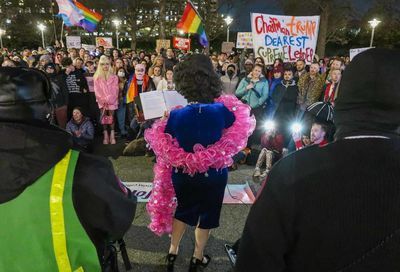On Wednesday evening, Oct. 20, the U.S. Court of Appeals for the Ninth Circuit put a temporary hold on the injunction against enforcement of the military’s ”Don’t Ask, Don’t Tell” policy – effectively putting the policy back on the books for now.
The court issued a temporary stay only to give it the time to consider whether to grant a stay in Log Cabin Republicans v. United States that will last throughout the government’s appeal of the case to the Ninth Circuit.
The temporary nature of the stay, as well as the ping-pong nature of the DADT policy’s enforcement since U.S. District Court Judge Virginia Phillips struck in down and issued the injunction on Oct. 12, led to an unprecedented move from the military, quick follow-up and political engagement from the White House and more court filings to help the court in deciding whether to issue the longer stay.
Until further notice, pursuant to a memorandum from Defense Secretary Robert Gates and a follow-up memorandum from Undersecretary of Defense for Personnel and Readiness Clifford Stanley issued on Oct. 21, no service member can be discharged under DADT without the ”personal approval of the secretary of the military department concerned, and only in coordination with me and the General Counsel of the Department of Defense.”
A senior Defense Department lawyer briefed reporters on Oct. 21 about the memos, saying, ”These two memos are primarily in reaction to … the temporary stay last night. We are clearly in a legally uncertain territory.”
”What Secretary Gates decided to do,” the official said, ”was to issue this directive … that from this point forward [directs] they are the ones who will be the separation authorities … in coordination with” Stanley and General Counsel Jeh Johnson.
Although the official said he could not comment on whether the decision was made in communication with the White House, administration officials were planning their own outreach, with deputy chief of staff James Messina and others meeting with repeal advocates on Oct. 26.
A person outside the White House familiar with the meeting agenda told Metro Weekly that there were three main points the White House was looking to impress upon attendees: (1) President Obama was pushing for lame-duck Senate action, (2) there would be more meetings up to the vote, and (3) executive options are not being looked at right now.
A White House aide confirmed that President Barack Obama, who has received harsh criticism for allowing the Department of Justice to appeal the LCR case, stopped by the meeting “to directly convey to the participants his personal commitment on this issue.”
Among the attendees, reported first by Kerry Eleveld at The Advocate, were Allison Herwitt and Joe Solmonese of the Human Rights Campaign; Shane Larson of the Stonewall Democrats; Winnie Stachelberg of the Center for American Progress; Aubrey Sarvis of the Servicemembers Legal Defense Network; R. Clarke Cooper of the Log Cabin Republicans; Alex Nicholson and Jarrod Chlapowski of Servicemembers United; Nathaniel Frank, DADT expert who is formerly of the Palm Center; and Jim Kessler of the Third Way.
On Oct. 25, meanwhile, attorneys for LCR filed the organization’s opposition to the government’s request for a stay. In the filing, Dan Woods argues that the government advanced arguments before the appellate court that it had not made to Judge Phillips, that a stay should not automatically be granted, that the government does not meet the standards for a stay and that a stay would be “more disruptive of the status quo than an injunction.”
Additionally, Servicemembers Legal Defense Network, Lambda Legal Defense and Education Fund, The Palm Center and Servicemembers United filed their own opposition briefs before the court in the form of amicus curiae, or friend of the court, briefs. Amicus briefs commonly are filed by people and groups interested in the outcome of a case even though they are not a party to the case.






















